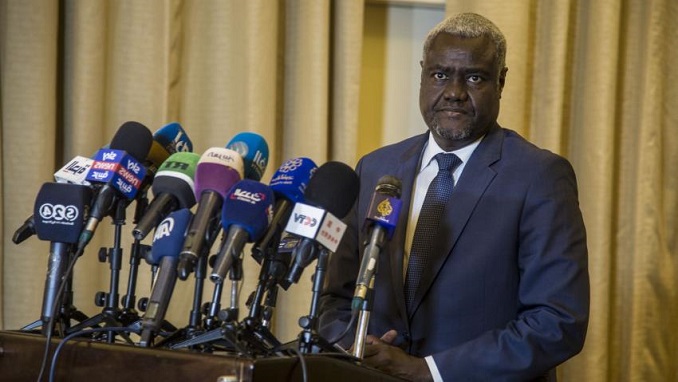The African Union on Thursday called for urgent and coordinated international action after a jihadist attack that killed dozens and uprooted thousands on the northern Mozambican coastal town of Palma, The New Arab reports.
The jihadists captured Palma on March 24, ransacking buildings and beheading residents and forcing thousands to seek safety in surrounding forest. Human Rights Watch said the militants indiscriminately shot civilians in their homes and on the streets.
Dozens have been killed, more than 8,000 displaced and many more are still missing following the coordinated attack seen as the biggest escalation of an Islamist insurgency that has battered Cabo Delgado province since 2017. Foreigners were among those caught in the violence, but the government did not say how many foreign nationals were killed. So far one South African is known to have died during the attack, his family confirmed to AFP.
Martin Ewi, a senior researcher with the Pretoria-based think-tank, the Institute for Security Studies, said that “over 100” people were still unaccounted for since the attack.
“That’s what we know so far,” he said, but added that the situation on the ground was confusing.
In a statement, AU chairman Moussa Faki Mahamat said he “condemns in the strongest terms the terrorist attacks”. Expressing “utmost concern” at the presence of international extremist groups in southern Africa, he called for an “urgent and coordinated regional and international action”.
Regional bloc the Southern African Development Community held emergency talks in Harare to discuss the violence.
Botswana’s President Mokgweetsi Masisi vowed regional help, but gave no details. He said SADC would “respond in a helpful manner that we assure the integrity and sovereignty of one of our own, never to be assaulted by dissident, rebellious and non-state actor forces that undermine the democratic credentials and peace in the region.”
But Mozambique President Filipe Nyusi on Wednesday downplayed the latest attack as “not the biggest”, despite its unprecedented proximity to Africa’s single biggest investment project.
Palma is around 10 kilometres away from a multi-billion-dollar liquified natural gas project (LNG) led by France’s Total and involving other international companies. Total had already suspended operations and evacuated some staff in late December after jihadists launched a series of raids near its compound.
Mozambique has sent troops to Palma to try and recapture the city.
Cabo Delgado’s jihadists have wreaked havoc across the province in a bid to establish a caliphate. The insurgents are affiliated to the Islamic State group, which claimed the attack on Palma this week.
The militant attack on Palma is the closest yet to the major gas project during a three-year Islamist insurgency across Mozambique’s north. Since October 2017, extremist fighters have raided villages and towns in the region, forcing nearly 700,000 to flee their homes.
Although they launched their campaign in 2017, experts say they had begun mobilising a decade earlier as disgruntled youths began drinking alcohol and entering mosques dressed in shorts and shoes. The violence has now taken root and claimed at least 2,600 people lives, half of them civilians, according to the US-based data-collecting agency Armed Conflict Location and Event Data (ACLED).
Local media reports said British workers may have been caught up in the Palma attack, and Britain’s Foreign, Commonwealth and Development Office said its embassy in Maputo was in “direct contact with authorities in Cabo Delgado to urgently seek further information on these reports”.
“The UK wholeheartedly condemns the appalling violence in Cabo Delgado. It must stop,” minister for Africa James Duddridge tweeted.
The United States, whose troops are helping train Mozambican forces to fight the insurgency, said Sunday it “continues to monitor the horrific situation in Palma”, adding that one American citizen who was in Palma had been safely evacuated. The embassy announced earlier this month that American military personnel would spend two months training soldiers in Mozambique.
